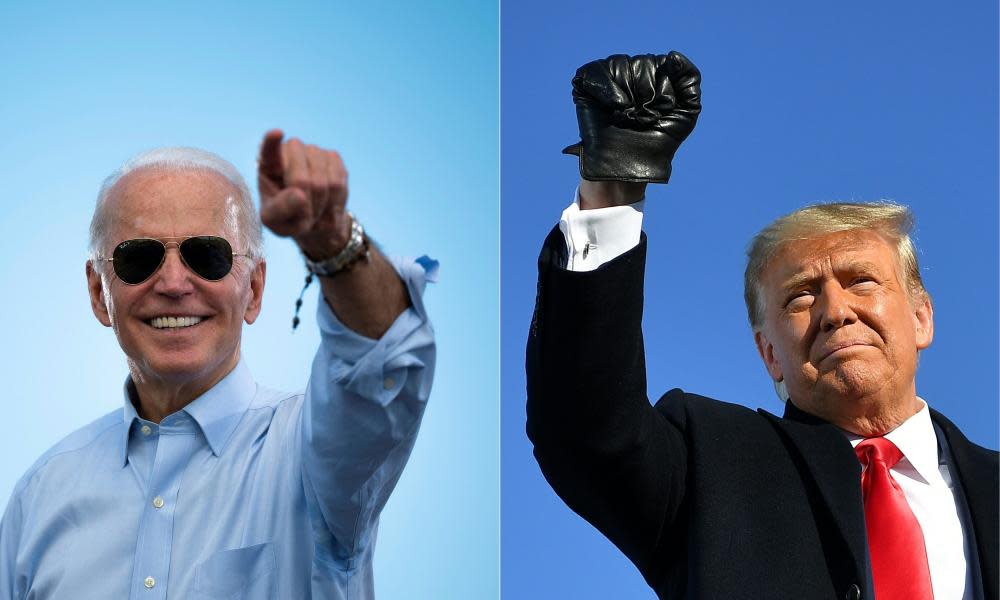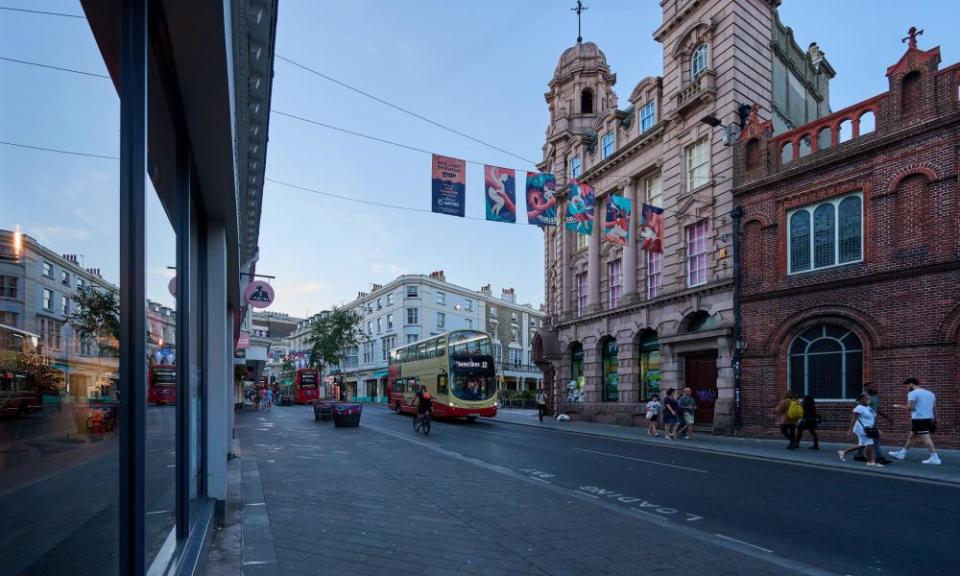Friday briefing: What to know about the Trump and Biden document stories – and why they’re very different

Good morning. Look, any of us with hoarding tendencies will understand the impulse. I have several cardboard boxes tucked away stuffed with pungent reminders of the past, ranging from underwhelming school reports to my first published article (a diary piece about Tom Jones’ alleged sexual prowess, as it goes). Luckily, since I am not and never have been president of the United States, literally no one cares.
For Donald Trump and Joe Biden, it’s a bit different. The documents that Trump squirrelled away at Mar-a-Lago, his Florida resort, included top secret files and sensitive intelligence on Iran and China; the items found at Joe Biden’s private office included intelligence memos and briefings on Ukraine, Iran, and the UK. You can see why people would be worried.
This is one of those stories that has a way of swirling around in the background without commanding your full attention – and the more that trickles out, like the news on Wednesday that an FBI search of Joe Biden’s holiday home had turned up no new documents, the more natural it is to throw your hands up and conclude that it’s too arcane to follow.
In truth, though, it’s not that complicated to understand why the stories matter, how they’re similar – and the much more significant ways in which they’re different. After the headlines, today’s newsletter takes you through both. Spoiler: Trump’s is worse.
Five big stories
Energy | The government is under pressure to rethink its windfall tax on energy companies after Shell reported one of the largest profits in UK corporate history, with the surge in energy prices sparked by Russia’s invasion of Ukraine pushing the oil company’s annual takings to $40bn (£32bn).
Interest rates | The Bank of England raised interest rates for a tenth consecutive time on Thursday from 3.5% to 4%, but said inflation may have peaked and a recession in the UK would be shorter and shallower than previously feared.
Health | The NHS has started the first clinical trial in the world pioneering a treatment technique that could extend the lives of people who have brain tumours, using detailed MRI scans and highly targeted radiotherapy before surgery.
Immigration and asylum | Hundreds of Afghan refugees who settled in London after fleeing the Taliban have been told they have only weeks to uproot and move 200 miles away to West Yorkshire, the Guardian can reveal. Some of the families have said they will refuse to go because their children will be further traumatised by the change.
Football | Prosecutors have dropped their case against Manchester United player Mason Greenwood, saying that there was “no longer a realistic prospect of conviction” after key witnesses withdrew cooperation. The 21-year-old, who was arrested and charged with attempted rape last January, denied the charges.
In depth: Why the Trump and Biden document investigations aren’t the same

When Donald Trump put out a statement last August saying that his “beautiful home, Mar-a-Lago” (above) was “under siege, raided, and occupied by a large group of FBI agents”, it was the culmination of a months-long effort to retrieve classified documents which he had taken from the White House.
A few days later, the release of the FBI’s search warrant revealed that he was under criminal investigation for potential violations of the Espionage Act. In the months after, as polls suggested that a comfortable majority of the American public thought Trump was in the wrong and the search was justified, it appeared to be a serious drag on his hopes of taking back the White House from Joe Biden.
Then, last month, the story of Biden’s own documents broke. (Even former vice president Mike Pence got in on the action last week when a dozen classified documents were found in storage at his home.) The parallel between the Biden and Trump cases is obvious: two presidents under investigation over the improper storage of classified papers, and fighting to protect themselves from the political fallout. But that surface resemblance obscures more than it reveals.
***
The scale of the discoveries
Trump: According to court filings (pdf), 15 boxes initially retrieved from Mar-a-Lago by the National Archives – the body charged with ensuring the security of sensitive government records – in January contained 184 documents designated confidential, secret, or top secret. There were about 700 pages in total, the Washington Post reported. Five months later, a single envelope containing 38 more such documents were handed over by Trump’s lawyers after a subpoena. While investigators were told that no further documents remained, the FBI raid found another 103 classified documents (some of which are pictured above). At least two more were found in a second search.
In total, more than 11,000 documents and photographs, the vast majority less sensitive, were found by the FBI – as well as 48 empty folders labelled “classified”. The Washington Post reported sources saying that they included highly sensitive intelligence about China and Iran which could expose US intelligence-gathering methods. Investigators reportedly believe that they were retained as “trophies or mementoes”.
Biden: On 2 November, lawyers for Biden found about 10 classified documents in a locked cupboard as they packed up an office he was vacating at the Penn Biden Center, a thinktank founded after Biden left the vice-presidency in 2016.
Biden’s lawyers conducted further searches at Biden’s home in Delaware, and found further pages of documents with classification markings, according to the White House, bringing the total to about 20. Six more classified items were found during an additional search in Delaware in January, according to a statement from Biden’s lawyer. This week, an additional FBI search of a holiday home, also in Delaware, found no further classified documents.
There is limited information about what they contained, but some were marked top secret, and reports have suggested they included “US intelligence memos and briefing materials that covered topics including Ukraine, Iran and the United Kingdom”. Biden’s lawyers have said they were “inadvertently misplaced”.
***
The response

Trump: The National Archives first realised that significant items appeared to be missing from the documents taken into secure storage at the end of Trump’s presidency in May 2021. It quickly asked for the return of those files from Trump, who delayed responding to repeated requests for their return for months. In January last year, 12 boxes of records were finally turned over.
As the National Archives reviewed the boxes, they found that they were “unfoldered, intermixed with other records, and otherwise unproperly (sic) identified”, which led the FBI to open an investigation – though it was reluctant to do so and cautious about how to proceed, the Washington Post reported.
The US justice department then issued a subpoena for additional records in May, when FBI agents who went to Mar-a-Lago to get them were given that single manila envelope. When the FBI finally gave up on a brokered search 60 days later, they raided the property. As well as the documents, they found security camera footage showing “that government records were likely concealed and removed”. That was 15 months after the National Archives first asked for the documents.
Biden: The National Archives were informed by Biden’s lawyers of the first set of documents’ existence on the day they were found, and had not previously been aware of any missing items. They were handed over the next morning. The first additional searches were carried out at Biden’s own behest, while this week’s was undertaken by the FBI with his cooperation. The White House says Biden’s team has continued to cooperate with the National Archives and the justice department.
At the same time, critics have pointed out that while Biden’s team was quick to cooperate with the investigation, it was slow to make any of this public. The discovery of the documents – shortly before the midterm elections – was not relayed even to most White House staff for 68 days, and only emerged publicly in a CBS news report.
Advisers who were aware “gambled that without going public, they could convince the justice department that the matter was little more than a minor, good-faith mistake”, the New York Times reported. Information about the discovery of a second set of documents was not included in the first public statements on the matter even though it happened weeks earlier.
***
The consequences
Trump: After the FBI raid, US attorney general Merrick Garland appointed a special counsel, Jack Smith, to oversee the investigation. Central to whether that concludes with charges is the determination of whether secret documents were intentionally kept from the FBI. A prosecution could also be brought if it is believed that Trump was guilty of “gross negligence” in allowing the documents to be removed from the White House in the first place.
While those would be serious charges, the news of the Biden investigation – even if it is in reality very different – appears to lower the political risk for Trump. And while politics should not in theory affect the legal question, the Biden case increases the need for “a pulverizing quantum and quantity of evidence” to bring a criminal prosecution, David Laufman, a former Justice Department official who oversaw the Hillary Clinton email investigation, told the Associated Press.
Biden: Garland also appointed a special prosecutor to oversee the Biden investigation – Robert Hur, a Trump appointee as US attorney for Maryland. No evidence has been revealed that Biden deliberately hid classified documents, and legal experts tend to view such a prosecution as unlikely, not least because by convention, sitting presidents are not indicted.
Despite all that, Trump’s defenders continue to present the two cases as of roughly equal gravity. Guardian US columnist Margaret Sullivan argued on Tuesday that part of the problem is an excess of media coverage which appears to take a “both sides” approach. She quoted a 2012 Washington Post piece by Thomas Mann and Norman Ornstein of the Brookings Institution: “a balanced treatment of an unbalanced phenomenon distorts reality”.
What else we’ve been reading
Even though Andrew Tate is currently remanded in custody in Romania, his influence, particularly on teenage boys, has continued to be felt in schools. Sally Weale spoke to the teachers and parents who are worried about his impact on impressionable youngsters. Nimo
Nobody has ever been convicted over the Omagh bombing, the single deadliest atrocity of Northern Ireland’s troubles. In this analysis, Rory Carroll explains the long legal odyssey for the victims’ families that ultimately led to yesterday’s announcement of an independent inquiry. Archie
After tracking Matteo Messina Denaro, the remaining kingpin of the Sicilian mafia and one of the world’s most wanted criminals, for almost a decade, Lieutenant Lucio Arcidiacono (pictured above) tells the remarkable story of his investigation to Lorenzo Tondo. Nimo
The latest layer in Haiti’s crisis is that the country’s police force is in revolt, blocking major roads, firing guns into the air, and attempting to break into the prime minister Ariel Henry’s residence. Luke Taylor has a very good piece explaining why. Archie
Despite being happier than ever as a single person, Moya Lothian-McLean writes about the continuing impulse to fret about romantic encounters. “I want my singlehood to become as boring to my own mind as it presumably is to everyone else,” writes Lothian-McLean, “Not some overwrought source of ‘empowerment’ nor a Bridget Jones-esque failure.” Nimo
Sport
Rugby | Ahead of the start of the Six Nations this weekend, the Guardian’s rugby writers give their predictions for how it will go. Meanwhile, Gerard Meagher writes that after a dreadful year, new coach Steve Borthwick (above) needs his England side to “find a way to light the fire among the Twickenham faithful”.
Horse racing | After more than two centuries, formal dress codes are being scrapped at Jockey Club courses. The change at tracks including Cheltenham, Aintree, Newmarket, Epsom and Sandown are part of a drive to make the sport more “accessible and inclusive”.
Football | Green Football Weekend, writes Jonathan Liew, is “one of those initiatives with a shiny website and a hashtag and a mixture of the well-meaning and faintly gimmicky”. Regardless, the Premier League isn’t taking part. Perhaps, he suggests, “the reason it has been so taciturn on the subject is the sort of questions it might invite”.
The front pages
The Guardian’s Friday print edition leads with “Calls for tougher windfall tax after Shell posts ‘obscene’ record profits”. The i has “Energy firms ordered to stop force-fitting prepay meters in Britain’s poorest homes”; similarly the Times says “British Gas banned from force-fitting new meters”.
The Financial Times splash sounds optimistic – “Stocks and bonds rally as investors bet interest rates are close to peak” – and the Daily Express joins in: “Don’t jump for joy just yet … but slump to end next year”. The Daily Telegraph puts the brakes on: “Lockdown damage to workforce is permanent”. “Greenwood: charges dropped” – that’s in the Daily Mirror, about the England footballer. “People don’t simply vanish into thin air” – the search goes on, as the Daily Mail reports, for Nicola Bulley. The Sun voices the “Family’s agony one week on … Where the hell is our Nicola?”
Something for the weekend
Our critics’ roundup of the best things to watch, read and listen to right now
TV
Nolly (ITVX)
After It’s a Sin, one can only imagine the options that Russell T Davies had for what to do next. I love the fact that he chose to make Nolly, a tender tribute to the TV soap star Noele Gordon (Helena Bonham Carter). It is warm, thoughtful and gorgeous, and by the end of it, I was a little bit in love with Nolly myself. Rebecca Nicholson
Music
Raye – My 21st Century Blues
Raye’s debut album arrives on the back of Escapism, not just a No 1 single but a fantastic one, and follows a split from her major label of seven years. It’s unclear whether Polydor wouldn’t release an album, or this album but, if it’s the latter, then their attitude wasn’t just patronising but genuinely baffling. Alexis Petridis
Film
Saint Omer
Documentary maker Alice Diop delivers a piercing fiction feature based on a real-life case. Rama (Kayije Kagame, above) is an author and academic writing about a shocking criminal case in the town of Saint Omer, near Calais – that of Laurence Coly (Guslagie Malanda), on trial for murdering her 15-month-old daughter. The gripping legal proceedings touch on race, class, gender, culture and the tide of history and power. Peter Bradshaw
Podcast
Shrink The Box
What happens when you put Fleabag, Ross Geller and Don Draper into therapy? The affable and smart Ben Bailey Smith teams up with psychotherapist Sasha Bates to find out what issues fictional characters have – and how viewers can learn from them. It’s a good introduction to the magic of therapy, with entertainment mixed in.
Hannah Verdier
Today in Focus

The children going missing from Home Office hotels
More than 200 unaccompanied child asylum seekers have gone missing from hotels used by the Home Office
Cartoon of the day | Ben Jennings
The Upside
A bit of good news to remind you that the world’s not all bad

LGBTQ+ retirement communities are far from a new idea – however, the UK has been lagging behind – until Tonic Housing, the UK’s first queer affirmative retirement community, opened its doors. Located in a coveted part of south-east London, a stone’s throw away from Waterloo and Tate Britain, Tonic Housing offers a roof garden with riverside views, as well as a lounge, floating garden, cafe, restaurant and roof bar. But most importantly, retirees are able to live in a safe space where they do not have to go back into the closet to avoid hostility from care staff. Instead they are welcomed into a community where they can foster friendships and mutually support one another.
“My body might be 72, but in my head I’m still 30. We’ve lived our lives, and done the scene. Trust me: I’ve enjoyed it,” says Steve Busby, a 72-year-old gay man living in the building. “This is my last chapter now – I don’t want to do that without being myself, truly.”
Sign up here for a weekly roundup of The Upside, sent to you every Sunday
Bored at work?
And finally, the Guardian’s crosswords are here to keep you entertained throughout the day – with plenty more on the Guardian’s Puzzles app for iOS and Android. Until Monday.

 Yahoo Movies
Yahoo Movies 
